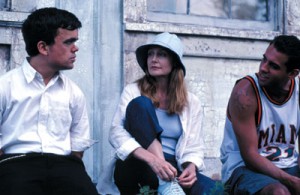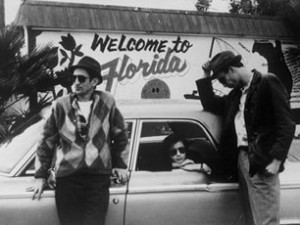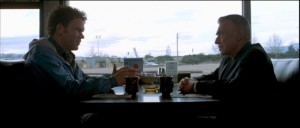The Art of Inertia

Watching The Station Agent, you fear it will be one of those overpraised independent movies admonished at festivals, but really a bunch of spare parts taken from various movies about a colorful small town, often with a “diverse” ethnic slant. However, the movie was extremely funny, and reminded me of the kinds of films that Jarmusch makes (made?), like Stranger than Paradise, where characters sit around and just live. There is no need to have a plot, the people in the film are interesting enough in what they say (or don’t say). The Station Agent is filled with this sort of thing, where all you need to know is etched on the actor’s faces, and their body language tells the rest of the story. The only time the movie chooses the wrong path is when there was some apparent need to add “incident” to the film, by giving us a phony dramatic turn near its conclusion. Thankfully, it redeems itself with a beautiful last scene that is more in the spirit of the rest of the film.
While this sort of thing might sound boring, movies theoretically should be about motion; emotional pain can be often more effective than physical pain. In The Station Agent, the characters hold back out of loneliness and despair, and these emotions are just inching under the surface in every scene. The main character, Fin, is a midget who is quiet and keeps to himself, which only makes others want to know about him and constantly inquire about his life and interests. Whether it’s because of their boredom living in the middle of nowheretown New Jersey, one of the other characters runs a coffee truck out by a train depot where Fin lives and people drive out of their way to go get coffee from him, or because of genuine interest, is not made clear. Nor is it important. I relished the quiet moments, where people sat next to each other as trains went by, or while they were reading, and Fin’s curt answers to the constant questions.
 This means you have to be patient with the film, otherwise the droll humor will never arrive for you. The Station Agent is not nearly as slow as Jarmusch’s work. Mystery Train and Down By Law have a similar feel of nothingness, but because of that it does miss out on how funny the deadpan jokes can be when time seems to stop (as opposed to the anxious dead spots of, say, Napoleon Dynamite). Stranger than Paradise is particularly fascinating because it is a film about boredom, but it is not boring as a result. The Station Agent is also, in a way, about boredom and I was happy that it was mostly content to stick to that.
This means you have to be patient with the film, otherwise the droll humor will never arrive for you. The Station Agent is not nearly as slow as Jarmusch’s work. Mystery Train and Down By Law have a similar feel of nothingness, but because of that it does miss out on how funny the deadpan jokes can be when time seems to stop (as opposed to the anxious dead spots of, say, Napoleon Dynamite). Stranger than Paradise is particularly fascinating because it is a film about boredom, but it is not boring as a result. The Station Agent is also, in a way, about boredom and I was happy that it was mostly content to stick to that.
 While it is [rarely] possible to develop characters through their reactions to plot maneuvering and twists (A Simple Plan is one of the few times this strategy has been effective), it is much more enthralling to try something where a man’s inaction or repression says more than what he does. He doesn’t have to be a hermit or inactive, but if you look at something like Hard Eight, where Phillip Baker Hall’s character is silent and solemn and manages to have such presence and weight, almost based entirely on how the wrinkles on his face tell the story of his life. When Sydney enters a room, everyone is aware of him, whether they know his past or not, the respect is granted immediately. It is one the many reasons why the first hour of that film is so amazing, and when the “story” kicks in after that, it loses a lot of steam (though through several viewings, I have come to appreciate this section as well) because Sydney’s past is forced to be dealt with.
While it is [rarely] possible to develop characters through their reactions to plot maneuvering and twists (A Simple Plan is one of the few times this strategy has been effective), it is much more enthralling to try something where a man’s inaction or repression says more than what he does. He doesn’t have to be a hermit or inactive, but if you look at something like Hard Eight, where Phillip Baker Hall’s character is silent and solemn and manages to have such presence and weight, almost based entirely on how the wrinkles on his face tell the story of his life. When Sydney enters a room, everyone is aware of him, whether they know his past or not, the respect is granted immediately. It is one the many reasons why the first hour of that film is so amazing, and when the “story” kicks in after that, it loses a lot of steam (though through several viewings, I have come to appreciate this section as well) because Sydney’s past is forced to be dealt with.
You can also see this sort of progression in Tom Noonan’s What Happened Was..., which takes place entirely on a first date at the woman’s house. There is one amazing (and long) scene where the female reads a story she has written, and most of what we see is Noonan’s face and how the story she reads is affecting both his state of mind and how he sees her from then on. What’s most incredible about the sequence is in the way it changes the power structure of the date, even though nothing is spoken between them, she is looking at the book, him listening. What began as him being condescending to her lack of education, shifts focus to more on the reality of his situation and his frustration with his limitations.
A lot can be accomplished when nothing seems to happen. It is often better unspoken or undone.



